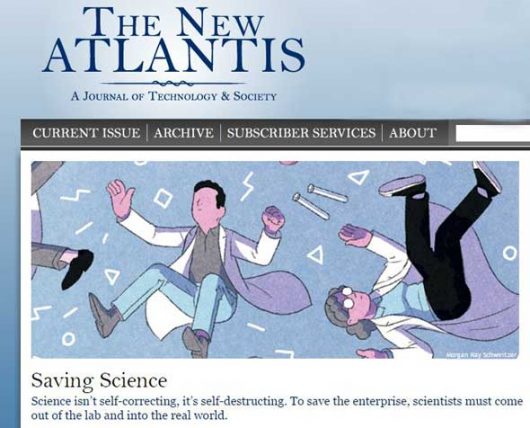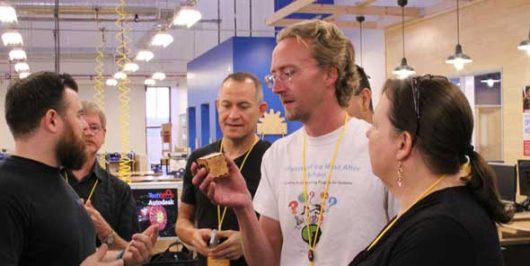News Flashes – August 2016
August, 2016
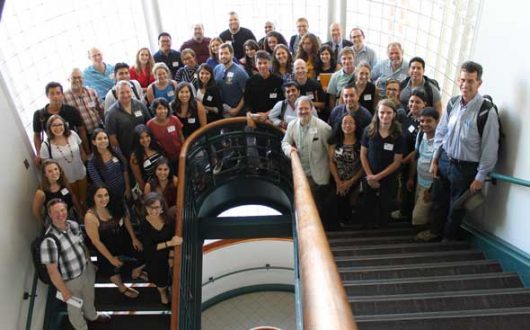 Faculty and students at new student orientation
Faculty and students at new student orientation
Inaugural Undergraduate Class
Welcome to all new SFIS students including our inaugural class of undergraduates — 17 students including first time freshmen, transfers from local community colleges, and students who were excited by the prospects of the new degree programs and decided to leave their original majors.One of the first major tasks in the creation of SFIS has been to develop undergraduate programs, and in late spring the university approved a Bachelor’s of Arts, a Bachelor’s of Science, and a Minor in “Innovation in Society,” and a Certificate in “Innovation for Impact.” The first courses include Andrew Maynard’s “Risk and the Future,” Laura Hosman’s “Innovation in Society,” and “The Future of the American Dream” taught by Michael Bennett and Lauren Keeler.
“Science and technology have a powerful impact on our everyday lives today and tomorrow,” said Jameson Wetmore, Program Chair for Undergraduate Education for SFIS. “We want to create inclusive futures where lots of voices are heard and lots of people have a say in what the world looks like as we progress. We are training a new group of students who will be able to consider possible futures and bring people from different disciplines together to build better futures.”
Visit the undergraduate program area of the SFIS website to learn more.
Sarewitz article makes waves
CSPO Director Dan Sarewitz urges scientists to leave the lab and get out into the real world in a provocative New Atlantis article. “Saving Science” is already being hailed as “a landmark article.” The New Atlantis tweeted that it is “one of the most important essays we’ve ever published.” Sarewitz deconstructs the myth that major breakthroughs usually spring from curiosity-driven research and advocates a use-inspired approach instead. A CSPO News article and 3 Quarks Daily blog offer more in depth review of the article here and a recording of New Atlantis’s interview with Sarewitz is available through this link. ASU Now also posted a review of the article, along with a Q&A session with the author.
CNS fulfills its NSF-funded mission
The Center for Nanotechnology in Society at ASU (CNS-ASU) fulfilled its 11-year mission under National Science Foundation (NSF) funding in August. CNS was formed in 2005 when the NSF announced a set of major research grants under the National Nanotechnology Initiative (NNI) to further emerging nanotechnologies, including the understanding of its societal implications. CNS secured an initial funding commitment of $6.2 million for five years to create a broad institutional network, institute a coherent research program, promote innovative educational opportunities, and engage in meaningful participation and outreach activities. In October of 2010, the NSF renewed that commitment with an additional $6.5 million. The NSF grants were augmented by additional funding supplements including the CNS-ASU Outcomes and Impact Study ($172,500); Broadening participation in the social sciences of emerging technology ($237,498); and Community-building around anticipation, integration and informal education ($250,000). Funding also came from a collaborative award for the Workshop of the Anticipatory Governance of Complex Engineered Nanomaterials with the University of Notre Dame ($34,250) and an associated award which funds the Virtual Institute of Responsible Innovation ($498,452). Though its NSF-funded research activities have reached a positive conclusion, CNS itself will continue to operate in new and exciting directions.
Dave Guston, Director of SFIS, has directed CNS since its inception while SFIS Associate Director for Faculty Clark Miller has operated as co-Principal Investigator and a number of SFIS faculty members – among them Jameson Wetmore, Cynthia Selin, Erik Fisher and CSPO Director Dan Sarewitz – have contributed as team leaders, members or collaborators. In May 2016, the final CNS Gala was held to commemorate the Center’s accomplishments, acknowledge its members and partners, and to envision future research avenues in the intersection of science, technology, and society. Over 100 faculty members, researchers, students and staff attended, representing nearly 50 institutions and more than ten countries.
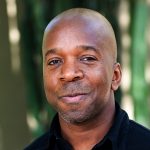 5-year art case of disputed identity reaches a verdict
5-year art case of disputed identity reaches a verdict
Associate Research Professor Michael Bennett was quoted in this Guardian article on a convoluted legal case surrounding disputed authenticity of a piece of art. The fact that the artist in question is still alive makes it a unique case. Bennett said, “I’m not confident enough to say there’s no precedent for this, but I’m confident enough to say this is extremely rare.” For a substantive overview of the case, follow this link.
The judge presiding over the case ruled in favor of the artist accused of painting the piece, Peter Doig, which was more likely painted by one Peter Doige, a carpenter and amateur artist who died in 2012. As reported in the Thai, French, British, Pakistani, Lebanese and Indian news organizations, “Judge Gary Feinerman ruled that there was ‘conclusive’ evidence that Doig did not paint the disputed work, and that he had the right to say a painting was not his.” In the future, Bennet told a Canadian paper, artists might have to use some form of technological solution, such as an embedded genomic watermarking, to avoid such a case from affecting them.
Out and About
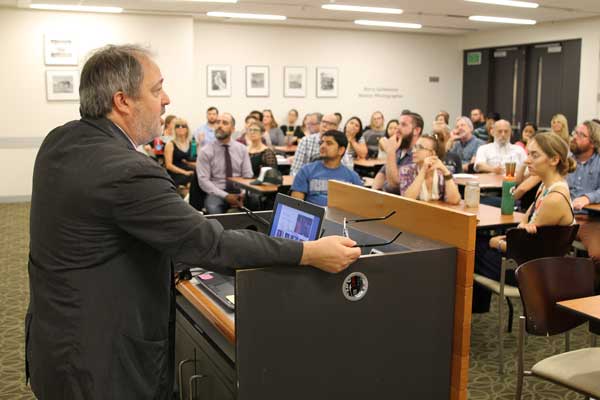
Dave Guston, director of SFIS, gave a presentation on the “State of the School” during the first of the semester’s enLIGHTeNING lunch series of talks. Video of the presentation is available here.

15 Fellows, chosen from a pool of almost 650 applicants, will work over the next two years on learning and applying the art of creative nonfiction to write compelling, original, and true stories about science and religion. The fellowship, sponsored by Arizona State University’s School for the Future of Innovation in Society (SFIS), is part of a two-year project lead by SFIS Distinguished Writer in Residence Lee Gutkind, CSPO Director Dan Sarewitz, and Program Manager Michael Zirulnik to write and publish engaging and inspiring nonfiction narratives of harmonies, reconciliation, and synergy between science and religion.
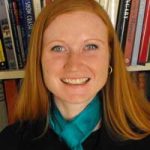 Recent faculty addition Laura Hosman, with a dual appointment between SFIS and the Ira S. Fulton School of Engineering, has hit the ground running with a new device that should help Pacific islanders gain access to books and lesson plans without needing internet access. As this web article outlines in more detail, her device, the Solar Powered Education Learning Laboratory (SolarSPELL) generates its own power through solar cell and its own wifi signal which it uses to mimic an internet experience. The device is waterproof, weatherproof and is being disseminated with the help of the Peace Corps. Hosman said ASU is a great fit for her and her project. “ASU supports social justice, inclusivity, hands-on teaching and multidisciplinary learning. It’s a perfect fit because that’s what I’m all about,” she said. Hosman and her team are curating content specific for Tongan islanders ahead of her planned trip there in January.
Recent faculty addition Laura Hosman, with a dual appointment between SFIS and the Ira S. Fulton School of Engineering, has hit the ground running with a new device that should help Pacific islanders gain access to books and lesson plans without needing internet access. As this web article outlines in more detail, her device, the Solar Powered Education Learning Laboratory (SolarSPELL) generates its own power through solar cell and its own wifi signal which it uses to mimic an internet experience. The device is waterproof, weatherproof and is being disseminated with the help of the Peace Corps. Hosman said ASU is a great fit for her and her project. “ASU supports social justice, inclusivity, hands-on teaching and multidisciplinary learning. It’s a perfect fit because that’s what I’m all about,” she said. Hosman and her team are curating content specific for Tongan islanders ahead of her planned trip there in January.
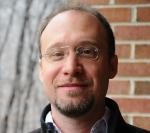 Associate Professor and HSD PhD Program Chair Erik Fisher presented at the Academy of Management annual Teach and Learning Conference in Anaheim, CA. Fisher is Director of the Socio-Technical Integration Research (STIR) program, which facilitates interdisciplinary dialogue geared toward enhancing capacities for more socially responsive research and innovation. Fisher provided a hands-on introduction to the STIR decision protocol that he developed in order to demonstrate how educational programs can support sustained interdisciplinary interactions that simultaneously promote greater empathy and enhanced creativity.
Associate Professor and HSD PhD Program Chair Erik Fisher presented at the Academy of Management annual Teach and Learning Conference in Anaheim, CA. Fisher is Director of the Socio-Technical Integration Research (STIR) program, which facilitates interdisciplinary dialogue geared toward enhancing capacities for more socially responsive research and innovation. Fisher provided a hands-on introduction to the STIR decision protocol that he developed in order to demonstrate how educational programs can support sustained interdisciplinary interactions that simultaneously promote greater empathy and enhanced creativity.
Upcoming Event
ASU Citizen Science and Maker Summit
October 26 (optional), 27, 28, 2016
04:30 pm – 7:00 pm
ASU Chandler Innovation Center
Downtown Chandler
Check the SFIS website calendar for more happenings!
In the Media
SFIS Professor and resident futurist Brian David Johnson was interviewed by Marketplace’s David Brancaccio. To hear Johnson talk about his current project to uncover the Future of the American Dream, listen to the recorded interview here.
This article from the UT Dallas News Center reviews the the summer issue of Issues in Science and Technology, the journal edited by CSPO Director Dan Sarewitz.
Publications
CSPO Program Manager Jason Lloyd authored an article, “Citizen Science Isn’t Just About Collecting Data,” for Future Tense, a collaboration among Arizona State University, New America, and Slate. “Citizen scientists can get involved in decisions about what gets researched, how research is conducted, and how results should be used,” wrote Lloyd. “This will require citizens like me to participate … and for scientists and policymakers to be more accepting of the public’s involvement in using the power of science to improve the world.”
SFIS professor Andrew Maynard, Director of the Risk Innovation Lab, wrote an article for Slate on the topic of human stem cell research in nonhuman primates and the controversy surrounding the potential creation of “chimeras,” human-animal hybrids. Considering the U.S. National Institutes of Health’s desire to support responsible research into human-nonhuman hybrids, Maynard wrote, “There are too many ‘should we?’ questions that must not be left solely to scientists.” Instead, Maynard advocated the inclusion of citizen representatives on internal review committees or augmentation of those committees with outside expert and citizen perspectives, such as those that organizations like the Expert & Citizen Assessment of Science & Technology (ECAST) network could furnish.
Dan Sarewitz authored “Donald Trump’s appeal should be a call to arms” for Nature. In it he posits that Trump supporters “are the cost of the prevailing myth of progress” before concluding that “policymakers should seriously consider what a system of socially responsible and responsive science would look like.”
Professor of Practice, Gregg Zachary authored an article in IEEE Spectrum: Cognitive Enhancement on the (Pokémon) Go in which he contends that “first-generation augmented reality games are harbingers of better mind-expanding tools.”
